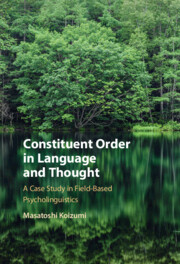Book contents
- Constituent Order in Language and Thought
- Constituent Order in Language and Thought
- Copyright page
- Dedication
- Contents
- Figures
- Tables
- Preface
- Abbreviations
- Chapter 1 Introduction
- Chapter 2 Kaqchikel Mayan
- Chapter 3 Word Order Preference in Sentence Comprehension I: Behavioral Studies
- Chapter 4 Word Order Preference in Sentence Comprehension II: fMRI Studies
- Chapter 5 Word Order Preference in Sentence Comprehension III: ERP Studies without Context
- Chapter 6 Word Order Preference in Sentence Comprehension IV: ERP Studies with Context
- Chapter 7 Basic Word Order in Language and Natural Order of Thought
- Chapter 8 Constituent Order Preference in Event Representation
- Chapter 9 Word Order Preference in Sentence Production I: Production Frequency
- Chapter 10 Word Order Preference in Sentence Production II: Time Course and Cognitive Load
- Chapter 11 Grammatical Processing and Event Apprehension
- Chapter 12 Syntactic Structure of Kaqchikel Revisited
- Chapter 13 Syntax and Processing Load
- Chapter 14 Concluding Remarks
- Book part
- References
- Index
Chapter 6 - Word Order Preference in Sentence Comprehension IV: ERP Studies with Context
Published online by Cambridge University Press: 19 January 2023
- Constituent Order in Language and Thought
- Constituent Order in Language and Thought
- Copyright page
- Dedication
- Contents
- Figures
- Tables
- Preface
- Abbreviations
- Chapter 1 Introduction
- Chapter 2 Kaqchikel Mayan
- Chapter 3 Word Order Preference in Sentence Comprehension I: Behavioral Studies
- Chapter 4 Word Order Preference in Sentence Comprehension II: fMRI Studies
- Chapter 5 Word Order Preference in Sentence Comprehension III: ERP Studies without Context
- Chapter 6 Word Order Preference in Sentence Comprehension IV: ERP Studies with Context
- Chapter 7 Basic Word Order in Language and Natural Order of Thought
- Chapter 8 Constituent Order Preference in Event Representation
- Chapter 9 Word Order Preference in Sentence Production I: Production Frequency
- Chapter 10 Word Order Preference in Sentence Production II: Time Course and Cognitive Load
- Chapter 11 Grammatical Processing and Event Apprehension
- Chapter 12 Syntactic Structure of Kaqchikel Revisited
- Chapter 13 Syntax and Processing Load
- Chapter 14 Concluding Remarks
- Book part
- References
- Index
Summary
Chapter 6 reports on an ERP experiment with a picture–sentence matching task, in which a picture was presented before the corresponding sentence. The target sentences used in this experiment were the same as those used in the experiment reported in Chapter 5, i.e., transitive sentences with thematically reversible agents and patients, arranged into four word orders: VOS, VSO, SVO, and OVS. The results of this experiment also demonstrated that SVO elicited a P600 compared to VOS, and that VSO elicited a similar posterior positivity, relative to VOS. The results of the two ERP experiments combined clearly indicate that VOS is the syntactically simplest and easiest-to-process word order of the grammatically possible ones in Kaqchikel, which is in line with our previous findings, described in Chapters 3 and 4. In short, Chapters 3 to 6 present data showing that a VOS preference was observed in Kaqchikel sentence comprehension, which provides empirical support for the IGV.
Keywords
- Type
- Chapter
- Information
- Constituent Order in Language and ThoughtA Case Study in Field-Based Psycholinguistics, pp. 61 - 65Publisher: Cambridge University PressPrint publication year: 2023

